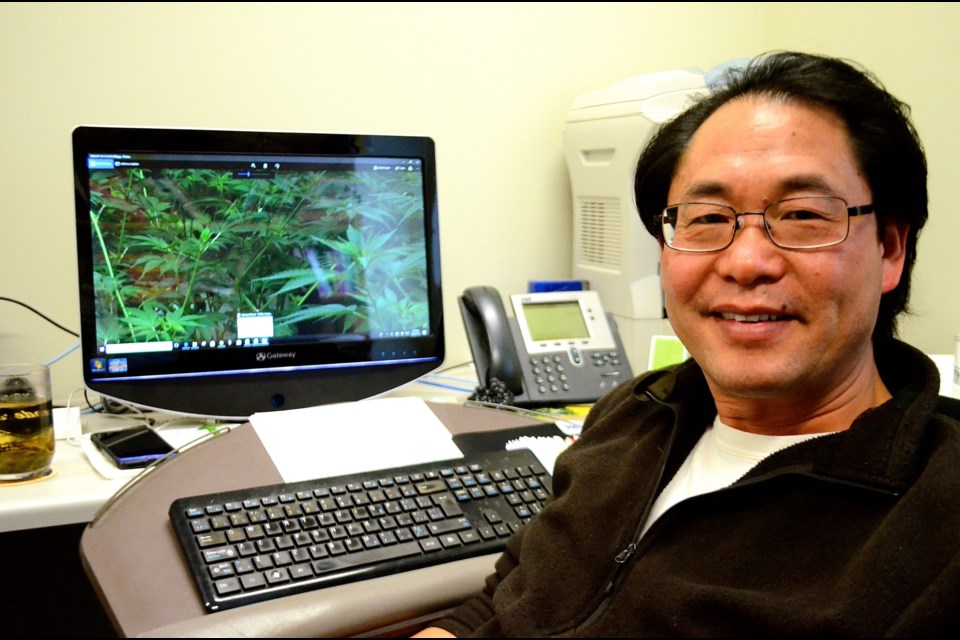The University of Guelph leads the world in medical marijuana cultivation research but you won’t find any grow ops on campus.
“We cannot do any research on campus because of Health Canada regulations,” said Dr. Youbin Zheng, associate professor of horticulture at U of G. “If you want to keep marijuana plants or product you have to have a secured place and the university is not secured at this moment.”
The research projects are carried out in facilities across the country that are operated by a growing number of licensed medical marijuana producers.
“The last time I checked there were 84 and 47 of them are in Ontario,” said Zheng.
“They are getting bigger and bigger with some of them going to 100 acres.”
Zheng was already a leading researcher in greenhouse and indoor plant production when he heard the story of a sick young girl.
“I never thought I would get into cannabis research but a few years ago I went to a horticulture conference in the States,” he said. “I was waiting for my flight home and the airport TV was playing a CNN documentary about a little girl named Charlotte that suffered from seizures.”
The girl’s parents refused at first to treat her with marijuana.
“Eventually, Charlotte’s seizures increased to 300 a day,” said Zheng. “She was dying so her parents took her to a marijuana grower in Colorado.”
The grower agreed to give Charlotte a strain of marijuana that was high in levels of cannabidol, or CBD, but low in levels of tetrahydrocannabinol, or THC, the chemical that makes you high.
“She tried it and right away it reduced her seizures,” said Zheng. “I thought, if I do this research I can help people to produce high quality cannabis to save lives. Why not?”
Marijuana has been illegal in Canada and most Western countries since the early 1900s, leaving most of the cultivation to illegal growers whose techniques and research failed to meet scientific standards.
The Canadian government legalized medical marijuana in 2001 giving Zheng and the U of G an advantage over researchers in the US where marijuana remains illegal under federal law.
“Yesterday (Jan 11, 2018) we published our second paper,” said Zheng. “That means we have published the first two scientific papers on how to produce marijuana in North America. When I say we are at the top I am not exaggerating because we are the leader for horticulture especially indoor plant and marijuana production research in the world.”
The research focuses on creating the ideal growing conditions to optimize each plants production of more than 110 known phytochemicals found in marijuana.
“There are many strains for medicinal use,” said Zheng. “They named that strain Charlotte and it doesn’t get you high but is helpful for treating seizures. They have other strains for painkillers and all kinds of things.”
The research and technologies developed by Zheng, Ph.D candidate Deron Caplan and the licensed growers have far-reaching medical, environmental and economic applications.
“This technology can be used to produce indoor pharmaceutical plants and also vegetables,” said Zheng. “The reason this is important is that our cities are getting bigger and bigger and our farmland is getting smaller and smaller. If you can produce vegetables indoor in the city you reduce the transportation costs and it is more environmentally friendly.”
By mimicking the natural cycle of the seasons and controlling the light, irrigation and temperature they are able to increase the number of growing seasons in a year. Water recycling reduces water consumption by six times or more and vertical farming increases growing space.
“This is a huge thing because in the middle of Toronto for example, if you have one acre of land you can produce 20 acres of plant material,” said Zheng. “Indoors we don’t have Mother Nature who is sometimes happy and sometimes not happy. We get a happy Mother Nature all the time.”
Funding for Zheng’s research has come from the licensed growers and the federal government’s Natural Science and Engineering Research Council but plans to legalize marijuana for recreational use this summer has increased public and private interest.
“The provincial government is trying to help because the majority of licensed growers are in Ontario,” said Zheng. “They want to make Ontario the world leader because economically it is going to be huge.”
Despite being the world’s leading marijuana research scientist Zheng has no interest in sampling the fruits of his work.
“I love it,” he said. “It’s my passion to do the research but I am not a user and don’t foresee that I will ever use it. Society is going to need high quality marijuana and we have the technology and expertise to help society. That’s my motivation for doing it.”